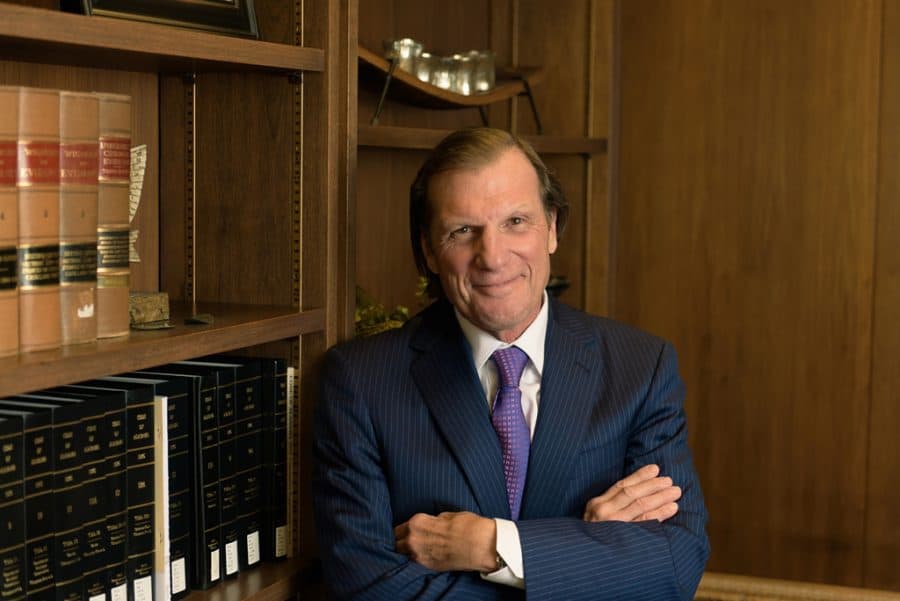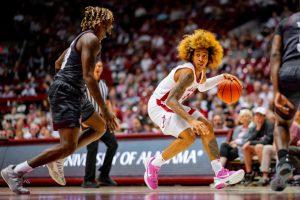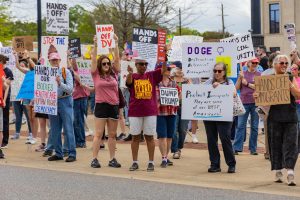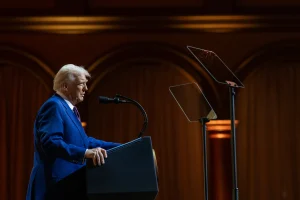Emails show Culverhouse decision unrelated to abortion ban
Hugh Culverhouse, Jr. pledged $25 million to the University last year.
June 9, 2019
The University of Alabama System has been adamant that the decision to return Hugh Culverhouse Jr.’s $21.5 million donation had nothing to do with his public disavowal of the Alabama abortion ban.
Now, they have receipts.
On Sunday, June 9, UA System spokeswoman Kellee Reinhart released email correspondences between trustee members regarding their decision to give the donor’s money back. While an official decision was made on Friday, new evidence reveals that conversations were brewing as early as May 17.
As the Culverhouse saga has unfolded on local and national news, both his and the University’s motives have been called into question – namely, the true relationship between Culverhouse’s political leanings and apparent in-house drama.
Upon receiving new information, the Crimson White thought these questions might be best answered in a timeline, so we made one for you.
Here’s what we knew two days ago:
May 28 at 4:24 p.m. – Chancellor Finis St. John sent out an email to the Board of Trustees strongly advising to return Culverhouse’s money, and that they would make a decision at the monthly meeting on June 7.
May 29 – Culverhouse’s team sent out a statement to media detailing his disappointment with what he viewed to be silence on matters of abortion legislation.
“As a lawyer, I cannot countenance a law school, especially one which bears my name, teaching state law that I believe to be wrong both constitutionally and morally,” Culverhouse stated.
Since the Alabama legislature provides a chunk of the University’s funding, he said, his first step toward rectifying the law was to protest the University. That day, flurries of headlines relayed his call to boycott the school.
May 29 at 5:23 p.m. – Reinhart sent the Crimson White and other local affiliates a release with St. John’s attached memo, stating that the decision to return Culverhouse’s money was unrelated to the abortion ban.
June 7 – St. John officially returned Culverhouse’s donations, totaling $21.5 million.
While Reinhart noted that the decision to return the money was not political, St. John’s email came in close timing with Culverhouse’s public statement. But now, it’s clear that trustees had been discussing how to handle an ongoing, and unrelated, feud with the donor weeks before he took to the national stage.
Here’s what we know now:
May 17, 2019, 8:52 a.m. – Culverhouse sent an email to Mark Brandon, dean of the law school, citing grievances about the college’s money-handling and requesting the law school treat him with the same courtesy he was given in the business school when picking candidates for the Chair positions. He stated that he felt he had not been thoroughly included in a decision to elect a Chair of the constitutional law program.
“To date, I have been feted, and kept in the dark,” Culverhouse wrote. “I could give a crap about newspaper articles or even the name on the law school. I want the school to operate the best and for now, you need to forget the ratings.”
May 17, 9:03 a.m. – Brandon responded, stating that the search for a Chair had already begun, but that he include Culverhouse in choosing from a list of candidates.
May 17, 9:30 a.m. – Brandon forwarded the above conversation to UA President Stuart Bell, stating that he thought Culverhouse lacked “fiscal logic” and affirming that he would meet about the Chair.
May 18, 11:38 a.m. – Culverhouse sent a message to Brandon suggesting he assign someone else to handle recruiting trips, then requested Brandon send cost estimates and breakdowns on the library. He then stated that he’d like to sit in on a class, and demanded that no one restrict him from doing so.
May 19, 12:18 p.m. – Brandon forwarded Culverhouse’s message to Bell and Chad Tindol, the Chief Administrative Officer, with a draft of a response. He stated that he was wary of Culverhouse’s desire to wander into his classroom, citing threats to academic freedom.
May 23, 4:01 p.m. – Brandon sent a list of the Chair candidates to Culverhouse.
May 23, 4:38 p.m. – Culverhouse responded that he intends to attend the interviews for the Chair candidates.
May 23, 11:02 p.m. – Brandon responded, “Thanks Hugh.”
May 24, 6:19 a.m. – Culverhouse responded to Brandon, re-stating previous grievances about not being involved early enough.
“I want to talk next week and go over every candidate, but your actions have resulted in my not giving any further gifts to Alabama and yesterday, I removed Alabama as a beneficiary from my will/trust,” he stated. “If you want to continue treating me as a subversive spy, simply change the name of the professorship to ‘The Richard Shelby Chair of Constitutional Law,’ and we will think of a cover story.”
May 24, 7:55 a.m. – Brandon apologized to Culverhouse, and promised to respond with more thought at a later time.
May 24, 1:14 p.m. – Culverhouse wrote to Bell, requesting back the $10 million he had paid ahead of the scheduled payment date.
May 24, 6:02 p.m. – Brandon issued another apology to Culverhouse and requested to set up a meeting to discuss candidates for the Culverhouse Chair.
May 24, 6:53 p.m. – Bell responded to Culverhouse, stating that he was surprised at the request and that the system would need time to consider logistics.
May 24, 8:04 p.m. – Culverhouse responded to Bell, urging Bell again to send back the payments. He also urged Bell to look over Brandon’s choices for Chair candidates, stating that he didn’t want his name attached to the position.
May 25, 6:37 a.m. – Culverhouse wrote again to Bell complaining about Brandon and his dissatisfaction with the Chair search, claiming that he would not know anything about the candidates had Bell not ordered Brandon to relay that information.
“You seem to think the quid pro quo is I give you the largest sum and commitment in the school’s history and you have no return consideration as your end of the transaction,” he wrote, demanding Bell process the return of $10 million of his payments.
May 25, 6:40 a.m. – Culverhouse responded to Brandon’s apology, stating, “at this point conversations are not worth the time.”
May 25, 3:32 p.m. – The Chancellor responded to Joe Espy, Chair of the Legal Committee of the board of trustees, about Culverhouse’s forwarded request, stating, “We need to do this immediately because it will only get worse.”
May 25, 3:49 p.m. – Espy requested Sid Trant of the System’s General Counsel create an outline for the return of Culverhouse’s donations, the renaming of the law school and the canceling of a constitutional law professorship.
“What he said to our president and about our president and Dean are absolutely unacceptable,” Espy wrote.
TAKEAWAYS
Despite public misconceptions, the dispute between Culverhouse and the University had nothing to do with the abortion ban and started over a week before Culverhouse released statements about opposing the University because of the state’s abortion law. Instead, it was about his desire to impact decisions regarding the law school, including the hiring process for the Chair of the Constitutional Law program.
The emails make clear that Brandon’s trepidation came from not wanting to give Culverhouse power over the law school.
“I worry, too, that his logic will convert the Endowment for Excellence into a recipe for mediocrity,” Brandon said in a May 17 email to President Bell. “And it may well blow up the Law school. If one wanted to see Florida or Georgia leapfrog Alabama, this would be one way to do it.”
While Brandon opposed giving Culverhouse too much control over the law school, he does not reject the idea of having the donor in a consultant position.
“As for the search for a chair-holder, I’m happy to involve him, solicit advice, and get recommendations and preferences,” Brandon said in the same email. “But we’ll be in trouble with accrediting bodies- and vulnerable in the various courts of public opinion – if we are ceding responsibility for choosing chair-holders (or any tenure-line faculty) to non-academics.”
This correspondence, however, is limited to recent events, and it is unclear whether Culverhouse’s claims of mismanagement from the law school and Brandon, specifically, are justified.
Regardless, UA System’s decision to return Culverhouse’s $21.5 million donation still stands.
If you’re wondering more about the relationship between the University and the state legislature, stay tuned. The effects this decision will have on the law school and the surrounding community will also be covered in a future story.





















